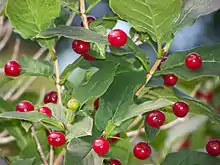Lonicera alpigena
Lonicera alpigena L.,[2] known as alpine honeysuckle,[3] is a species of honeysuckle native to mountain forests of Central and Southern Europe. It is sometimes cultivated as an ornamental plant outside its native range. It is a deciduous shrub up to 2 m high, and in late summer, bears conspicuous brilliant red inedible fruits superficially resembling cherries. L. glehnii F. Schmidt, which is native to Sakhalin, Kurile Islands, Hokkaido and Honshu, is sometimes considered as a geographically disjunct subspecies of alpine honeysuckle, L. alpigena L. subsp. glehnii (F. Schmidt) H. Hara.
| Alpine honeysuckle | |
|---|---|
 | |
| Scientific classification | |
| Kingdom: | Plantae |
| Clade: | Tracheophytes |
| Clade: | Angiosperms |
| Clade: | Eudicots |
| Clade: | Asterids |
| Order: | Dipsacales |
| Family: | Caprifoliaceae |
| Genus: | Lonicera |
| Species: | L. alpigena |
| Binomial name | |
| Lonicera alpigena | |
| Synonyms[1] | |
| |
References
- "The Plant List: A Working List of All Plant Species". Retrieved 7 December 2014.
- Not to be confused with L. alpigena C.B. Clarke, syn. L. webbiana Wall. ex DC.
- BSBI List 2007 (xls). Botanical Society of Britain and Ireland. Archived from the original (xls) on 2015-06-26. Retrieved 2014-10-17.
External links
 Media related to Lonicera alpigena at Wikimedia Commons
Media related to Lonicera alpigena at Wikimedia Commons Data related to Lonicera alpigena at Wikispecies
Data related to Lonicera alpigena at Wikispecies
This article is issued from Wikipedia. The text is licensed under Creative Commons - Attribution - Sharealike. Additional terms may apply for the media files.